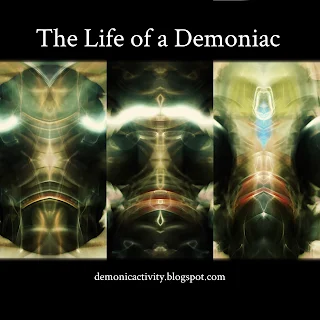If you are a victim of demonic activity in the manner described on this blog, you should consider it is as much your duty to fight the problem as you consider it your duty to protect others and yourself from any other kinds of harm; and, you must do so with the same intensity and sense of urgency you would for any other form of tragedy or crisis.


Failing to do so endangers other victims—not just you. Like you, every victim is an asset to a well-established and tightly operated and controlled industry by both demons and humans (who are experienced, capable and well-trained). If you let the problem go unabated and unchallenged, or if you fail to take comprehensive and effective action, you inadvertently support that industry. It knows how to feed off your inaction, and it makes prodigious use of half-ass resistance (in fact, it encourages or otherwise provokes (and also depends on) your dislike of their treatment of you and the situation they place you in to create out of you the kind of product they aim to manufacture).


It is one thing, then, to fail yourself; it is another to fail others, too. No one asks for that duty; no one hopes to find themselves in such an arduous, dangerous and taxing role. But, the fact is, it is what you must do when you are faced with this problem. You are derelict in your duty as a responsible member of the human community if you don't.
There are victims I feel sorry for, and there are victims I don't. As to the former, I'm referring to all of them; as to the latter, none. I feel sorry for any human burdened by a problem like this. It is the end of a possibility of any life you dreamed of (although, you can have a good one—and, I'd say a much more respectable, wisened one than you ever imagined—but, it's certainly not what you thought it would be, and the initial sting of that realization takes a long time to stop having its startling and disconcerning effect).
So, while I feel equally sorry for all victims, there are some I feel I
should give more respect for than others: particularly, those who get up and fight with everything they've got. And, I
would if I could find such a person. As of today, since the memory of my first encounter with the problem over 40 years ago, and since the problem became publicly visible and openly overt over 12 years, I have come to know only these kinds of victims:
- those who fail to acknowledge that they are a victim;
- those who think they can make (or are making) deals with demons or others in order to stay abreast of the problem; and,
- those who think they never will be victims, and that there is no relationship with or connection between them and victims.
NOTE | Soon-to-be-victims may not be victims in the present tense; but, as I see it, they will be soon enough—if not by the hand of the demons, then by mine. As the Door (or, Engine, as demons put it), I have the ever-ready power to force the issue—an issue I have the moral authority to force, even though I should not have to. Moreover, as a victim heaven-bent on eradicating this problem, it will be what I do (and have been doing), if I have to. Such persons will not ignore it or sit on the sidelines and passively watch it; it will be your problem, too, before I let that happen for long.
How to fulfill your duty as a victim
The first step in fulfilling your duty as a victim is making yourself known to other victims. This is the hardest step, and it is the one step that takes most victims far too long to take. The hindrances generally stems from shame and guilt. The pretext of demons' involvement in a victims life from the start is invariably based on those two emotions. They can and do create a new picture of the world around a victim, and one that portrays a highly critical and punishment-oriented society that is unaccepting and unreceptive to anyone who commits or has committed any kind of transgression (most commonly, drug use), and eager to harm or allow harm (even fatal) to such persons. On top of that, demons foster such a world out of the people they blind and harden, and otherwise render and keep ignorant; so, it's not just a perception, it's a reality in a lot of cases.
The second step is to take hard and fast action, to put out the fire in your home so as to prevent it from spreading to other homes, so to speak. The following conversation between me and another victim describes what such action looks like. The lengthiness of my contribution to that conversation is a reflection of my respect for a victim who dared to take the first step.
 |
 |
| I haven't received the clip referred to by the victim; but, I hope to soon |
 |
 |
I start by addressing every misconception and possible misconception the victim presented;
they are the most common among all victims |
 |
 |
| Add caption |
 |
 |
| Add caption |
 |
 |
| Add caption |
 |
 |
| Add caption |
 |
 |
| Add caption |
>
 |
 |
| THIS ONE |
 |
 |
| Add caption |
 |
 |
| Add caption |
 |
 |
| Add caption |
 |
 |
| Add caption |
 |
 |
| Add caption |
text...






























